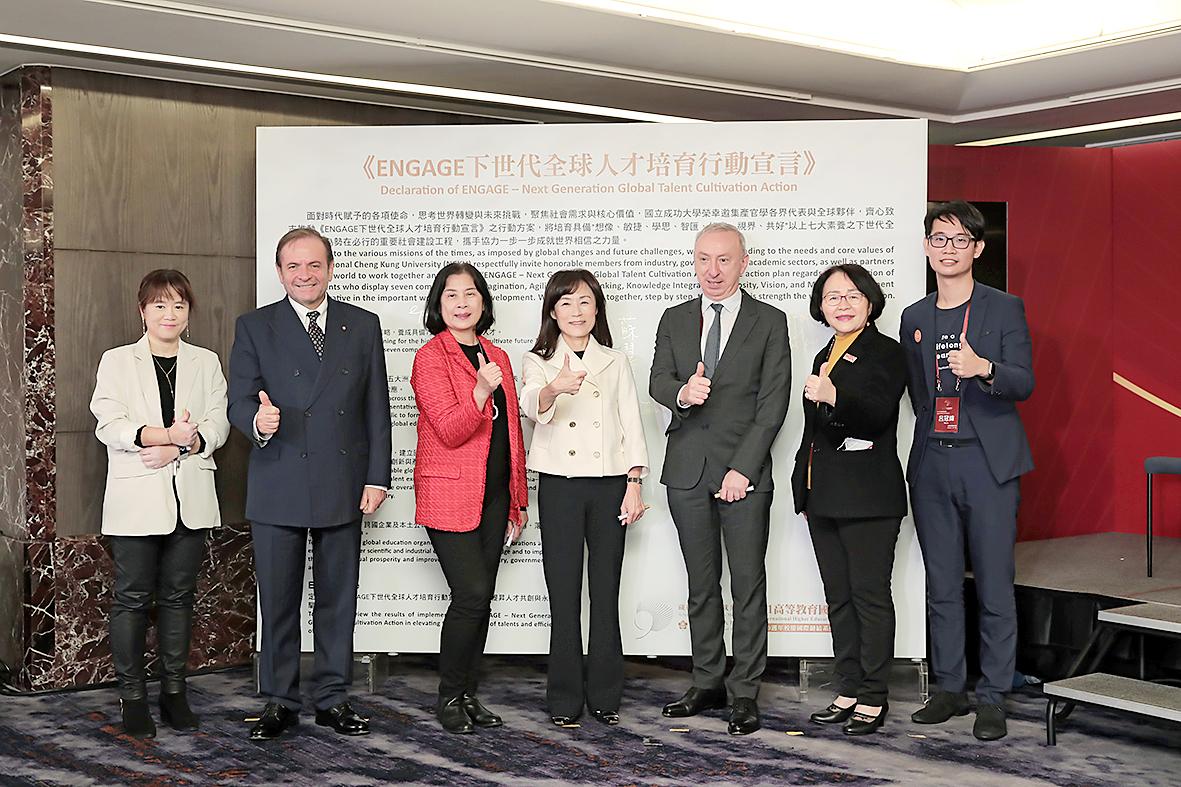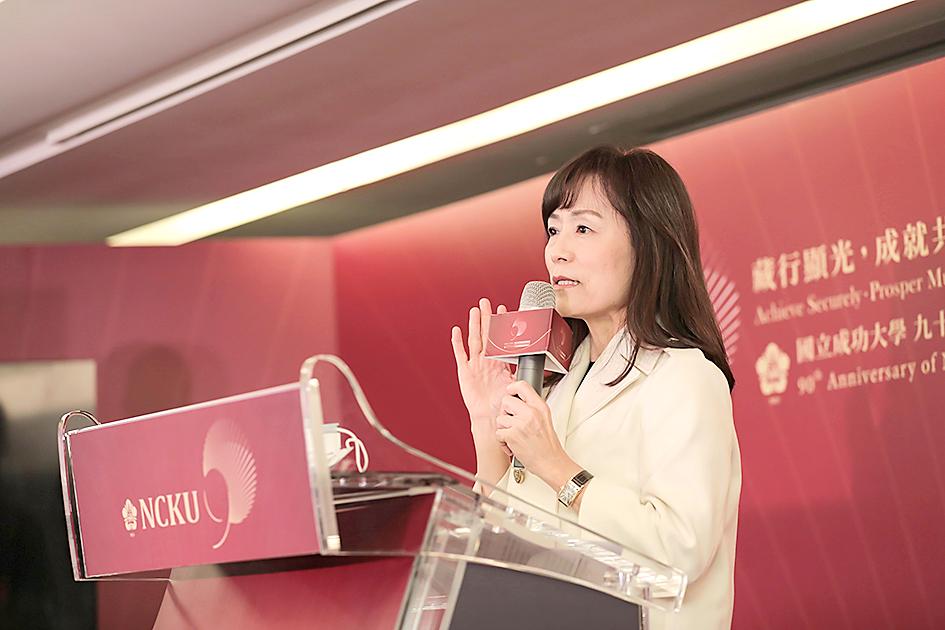More than 90 representatives from academia, industry and the government yesterday discussed global trends for cultivating talent and interdisciplinary learning in the post-COVID-19 era at this year’s International Higher Education Symposium.
The symposium was organized by National Cheng Kung University (NCKU), which this year celebrates the 90th anniversary of its establishment.
Forum participants also signed the “Declaration of ENGAGE,” a global talent cultivation action plan.

Photo :courtesy of NCKU
NCKU president Jenny Su (蘇慧貞) told a news conference in Taipei before the symposium that the university at the beginning of this year met with 3,000 human resources personnel in Taiwan and overseas.
Forty percent of them said that 20 percent of jobs would need to have their descriptions redefined in 10 years, while 80 percent of them said 20 percent of jobs require different skill sets, she said.
“As a university, the biggest challenge we are facing is that we are in a different age, and students need to be equipped with different competencies,” she said.

Photo :courtesy of NCKU
Through the ENGAGE action plan, the university hopes to achieve five goals, Su said.
First, it aims to enhance strategic planning for higher education and cultivate talented people who display imagination, curiosity, learning, thinking and other key competencies, she said.
Second, NCKU aims to make Taiwan a center of higher education and guide the direction of global education, she said.
Third, the university plans to promote “sustainable global advancements” by establishing a mechanism for transitional mobility and talent exchange, she said.
Fourth, it is to work with education organizations, as well as multinational and local enterprises, to gather experiences and knowledge, so that the industry, government and academia can improve collectively and mutually prosper, she said.
Fifth, the university plans to regularly review the results of the action plan to improve the efficiency of talent-creating mechanisms, she said.
Nicole Lee (李彥儀), director-general of the Ministry of Education’s Department of International and Cross-strait Education, said that international cooperation has occurred more frequently because of the COVID-19 pandemic, adding that more people are becoming aware of the importance of integrating different academic disciplines.
The use of artificial intelligence in digital learning would be more common in the post-pandemic era, Lee said, adding that all these are crucial factors to consider when cultivating highly educated talent.
Marketech International Corp chairwoman Margaret Kao (高新明) said her company, like chipmakers and flat-panel makers in Taiwan, all face a shortage of talent.
“Without talent, Taiwan will lose its global competitive edge 10 years from now,” she said. “Universities are key incubators of talent.”

A strong continental cold air mass is to bring pollutants to Taiwan from tomorrow, the Ministry of Environment said today, as it issued an “orange” air quality alert for most of the country. All of Taiwan except for Hualien and Taitung counties is to be under an “orange” air quality alert tomorrow, indicating air quality that is unhealthy for sensitive groups. In China, areas from Shandong to Shanghai have been enveloped in haze since Saturday, the ministry said in a news release. Yesterday, hourly concentrations of PM2.5 in these areas ranged from 65 to 160 micrograms per cubic meter (mg/m³), and pollutants were

Taiwan’s armed forces have established response protocols for a wide range of sudden contingencies, including the “Wan Chun Plan” to protect the head of state, the Ministry of Defense (MND) said today. After US President Donald Trump on Saturday launched a series of airstrikes in Venezuela and kidnapped Venezuelan President Nicolas Maduro, concerns have been raised as to whether China would launch a similar “decapitation strike” on Taiwan. The armed forces regularly coordinate with relevant agencies and practice drills to ensure preparedness for a wide range of scenarios, Vice Minister of National Defense Hsu Szu-chien (徐斯儉) told reporters before a

EVA Airways on Saturday said that it had suspended a pilot and opened an investigation after he allegedly lost his temper and punched the first officer several times as their plane was taxiing before takeoff at Los Angeles International Airport. According to a report published on Thursday by The Reporter, the incident occurred after the flight’s Malaysian first officer tried to warn the Taiwanese pilot, surnamed Wen (文), that he was taxiing faster than the speed limit of 30 knots (55.6kph). After alerting the pilot several times without response, the first officer manually applied the brakes in accordance with standard operating

NOT AN OPENING: Trump’s violation of international law does not affect China’s consideration in attacking Taiwan; Beijing lacks capability, not precedent, an official said Taiwanese officials see the US’ capture of the president of Venezuela as a powerful deterrent to Beijing’s aggression and a timely reminder of the US’ ability to defeat militaries equipped with Chinese-made weapons. The strikes that toppled Venezuelan President Nicolas Maduro signaled to authoritarian leaders, including Chinese President Xi Jinping (習近平), US President Donald Trump’s willingness to use military might for international affairs core to US interests, one senior official in Taipei’s security circle said. That reassured Taiwan, the person said. Taipei has also dismissed the idea that Trump’s apparent violation of international law could embolden Beijing, said the official, who was not